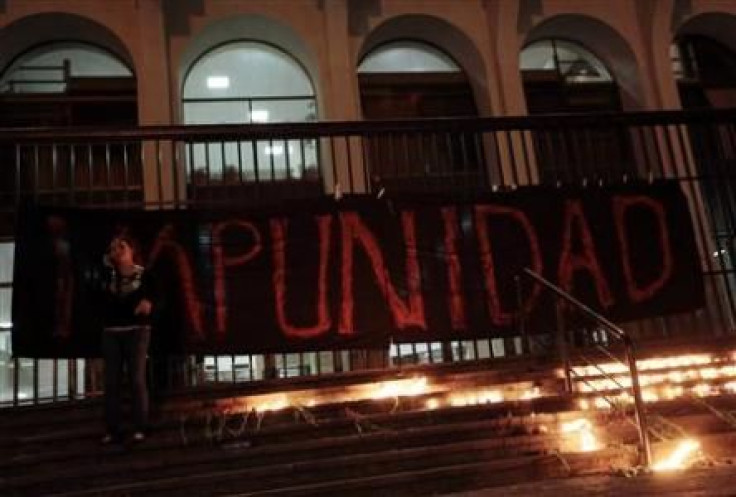
The trial of former Guatemalan military general and dictator José Efraín Ríos Montt for genocide and crimes against humanity recommenced this morning after a 5-day suspension. Ríos Montt, 86, who ruled Guatemala from 1982-1983, is being tried along with his intelligence chief, José Mauricio Rodríguez Sánchez. The case is the first genocide trial in history to be undertaken in the same country in which the crimes were allegedly committed, and has been called "the trial of the century" for Guatemala. It was feared that the case would be annulled after a lower court judge declared all proceedings invalid on April 18 due to "an apparent breach of due process".
Ríos Montt and Rodríguez Sánchez were formally charged in January 2012 by Guatemala City judge Patricia Flores. She then stood down from the case due to her involvement with another implicating the former dictator. On April 18, after the trial had begun, Judge Flores told a court that she had been wrongly removed from the case and ruled that due process had not been respected, reversing the trial to the preparatory phase. That meant that the procedure again came open to appeals, while all of the testimonies and expert witnesses who had appeared during the trial would have to re-present their evidence.
Judge Flores was later ruled by another judge to have "exceeded her functions". Today marked the return to trial of the case.
General Ríos Montt seized power in 1982 in a military coup and ruled Guatemala for 17 months. That time proved perhaps the most horrific of the 36-year civil war as the army doubled down on its scorched-earth operations in the Mayan highlands in their efforts to oust leftist guerillas.
In the courtroom, witnesses described the rapes and massacres which took place in Mayan villages. And in a twist which provoked gasps from many in the courtroom, a former army mechanic unexpectedly testified that current Guatemalan president Otto Perez Molina had ordered many of the atrocities. Perez Molina is a former general and intelligence officer and had been a field commander in Nebaj, where some of the massacres had allegedly taken place.
Allan Nairn, a journalist who had reported from the war zones, wrote after Judge Flores annulled the case that he had been called in to testify as a "qualified witness", but was kept off the stand "in order to avoid a confrontation with the president".
"What that meant," Nairn wrote, "I was given to understand, was that Gen. Otto Perez Molina, Guatemala's president, would shut down the case if I took the stand because my testimony could implicate him.
"Beyond that, there was fear, concretely stated, that my taking the stand could lead to violence since given my past statements and writings I would implicate the 'institutional army.'"
Almost a hundred witnesses had delivered testimony by the end of April.
© 2024 Latin Times. All rights reserved. Do not reproduce without permission.